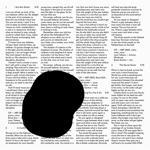
Owen Pallett In Conflict
(Domino)
Considering his near ubiquity, in certain musical circles at least, it’s odd that so much of Owen Pallett’s solo career has been marked by long periods of silence. His first and second records may have appeared within just over a year of each other, but it took another four years (and the dropping of a pseudonym) before his third hit the shelves, and an equally long gap for this, his fourth. And it's difficult to not approach this record as a reviewer with a sense of anticipation, making the already daunting prospect of dissecting a Pallett record even more so.
Pallett’s public persona, not to mention his prodigious work to date, marks him out as an extraordinarily smart guy, more than capable of writing rings around any music critic out there, and one very aware of how he’s perceived, and how he wants his music to be perceived. Consider the very conscious effort to reroute an already successful career on that third album; as clear a case of “putting away childish things” as you’re ever likely to find, not just in his ditching his former J-RPG-indebted moniker in favour of his own name (or at least, part of it), but in taking the literate, fantastical and really quite arch storytelling of his earlier work and blowing it up to extreme proportions; turning in an agrarian sci-fi concept album, which starts off sounding uncannily like a score for a Miyazaki film, before taking a turn towards the homoerotic, and culminating in the album’s characters rising up against their creator, in a very Pirandello sort of way. And so In Conflict feels like something of an artistic year zero; that, given Pallett seemingly took his fantasy leanings as far as he could, what now lies on this particular record is something more of the unvarnished truth, a notion that's emphasised by the stark cover design that showcases the album’s lyrics.
And yet, for all that, there's a sense that the real Pallett remains just as slippery and difficult to know as ever.
He's always had an elfin sort of charm, and the problem (or advantage) that comes with that is that it's hard not to read everything he says in quotation marks, something which might be the result, or the cause, of his past propensity to sing about characters. In Conflict's unusual forthrightness seems like an invitation to, for once, take everything he says at face value, and while some of the album's subject matter seems a little clichéd - the urban alienation of On a Path, for instance, seems a long way away from the slightly naughty, and very nerdy tales of his previous work - the cheeky sauciness of the title track is more like familiar territory, while the concerns about ageing, and childishness and childlessness are interesting new ground (that Song for Five & Six somehow manages to marry a musing on infantile existential terror to a rhythm track that, driven by pizzicato strings, sounds not unlike Call Me Maybe is something of a masterstroke).
Somewhat fittingly for an album titled In Conflict, however, is the fact that the album sees him laying himself most bare, such as in The Passion’s relatively straight (in both senses) tale of romance, but it also sees him at his most guarded. Like that large inkblot that obscures the text of the minimalist cover design, the fact he doesn't let himself go emotionally for once. His previous albums were gloriously punctuated by moments where his honey sweet voice was pushed to breaking point, and they’re very much noticeable by their absence here.
Not that the same complaint can be levelled against the music. Much of the record is filled with lush movie-like orchestral arrangements (The Secret Seven could be said to have a bit of a John Barry influence, while the majestic horn section that opens Chorale evokes a very Eastern sense of grandiosity), as if to remind the listener that he is now, in fact, Academy-Award Nominee Owen Pallett. It’s also notable that this is his most obviously ‘electronic’ record to date. The dance-music textures of the likes of The Riverbed have earned his rhythm section several co-writing credits, and create a sense that where Pallett has frequently sung about sex, this might be the first of his albums to really let the act permeate its sound. Perhaps less successful however, is the much-publicised work on the record by Brian Eno, which, while never out of place as such, often seems a bit chintzy and unnecessary.
In other words, Pallett's turned in a customarily complex record, where the conflict of the title might well be referring to his compositional instincts. Despite the running theme, the songwriting lurches from one song to the next, at one point a bit too much to take, in another sketchy and half formed, as perhaps best exemplified by the album’s abrupt ending, creating a slightly frustrating sense that the final, out-of-place note should really be leading somewhere that it doesn't go.
In Conflict is either one of those records which invite thoughtful criticism, with the repeated phrasings and imagery occurring throughout the record (not to mention the swooningly lush orchestrations) suggesting vast rabbit warrens in Pallett’s psyche worth considering, or render it entirely pointless, given that it seems set on creating something immaculate, and then mercilessly deconstructing its creator.
